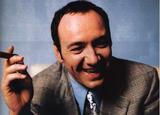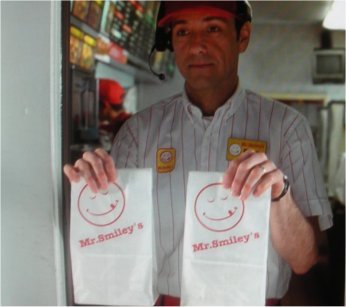One of the greatest dramas I've ever seen is American Beauty. Lauded by tons of critics, winner of a dozen awards, on the lists of countless “Best of...”; its already been turned upside down in interpretation. It's a satire, a drama, a love story, an attack on middle America. It's everything to everyone. I haven't read all reviews and essays on it, but I haven't come across anything that has taken a more face-value interpretation of the movie. Specifically, that Lester Burnham, the hero of the movie because he rejects the materialism and hollowness of suburbia, is in fact a new icon of traditional marriage and alpha male behavior.
Let's summarize: 40-year-old Lester has hit his mid-life crisis with the speed of the space shuttle. Caught between his monotone job at a media magazine, insecure daughter Jane and cold wife Carolyn, Lester has felt hollow and “dead” for years. But, as he tells the audience in the first act, “its never too late to get it back”. Lester does this by becoming infatuated with Jane's flirty best friend Angela, buying pot from his new neighbors' son, quitting his job and blackmailing the company and pretty much doing whatever he wants. The movie also has several sub-plots including affairs, courtships, homosexuality, death, beauty, etc, but our focus is the lovable “Les”.
When we first see Lester, he wakes up like many of us do: completely unenthusiastic with what is to come in the next 10-14 hours. Dressed in a two-piece pajama outfit, which has vertical stripes akin to prison bars, he gets into the shower for a daily dose of his happy time. He calls it “the high point of my day”. Through a window, he watches his wife out in their garden, already in her work clothes, trimming roses. She chats idly with their very friendly neighbor Jim, and his lover... Jim. Lester's morning ends with his briefcase opening up on him after being nagged by Carolyn about being late. The look she gives him is as cold as liquid oxygen. Suffice to say, Lester could die in his sleep and he wouldn't be the only one happy with the death.
Between this sequence and the Angela catalyst, we are shown how much Carolyn is defined by status and work. When Lester tells her that his employer is making everyone write out a job description to find out who's worth keeping, she immediately tells him to write it. We don't hear the entire conversation, but it can be assumed he mentioned that a manager at the magazine lost $50 000 of company money on a hooker. During dinner, Carolyn plays old jazz and big band tunes much to the chagrin of her husband and daughter. She steamrolls their objections with a “I cooked dinner” defense. The next day, Carolyn, a realtor, shows a house to several people, but none bit at the juicy apple. She reacts to this failure badly, crying hysterically and slapping herself in an empty room of the house. But as fast as she began she stops, silently walking out of the room.
In the movie, Carolyn is made out to be the bad guy, and she is on so many levels. Her careerism, her materialism, her coldness towards her husband are all bad things, but she isn't entirely to blame. Lester is the man, the husband, the protector and provider. As a husband, its Lester's job to take control and direct the family. But he didn't. Somewhere, he let his responsibilities go and let Carolyn take hold. I noticed that Lester's actions are mostly defined by his relationship with Carolyn. Would Lester need to have a infatuation with a teenage cheerleader if his wife was more loving? Probably not. Though I'm not excluding that a major driving force of his change is to sleep with Angela; Lester was, before and after seeing Angela, controlled directly and indirectly by the actions of his wife. His relationship with Jane is not outside this, either. His long ignoring of his daughter is paralleled by his wife's, except she isn't remorseful about it. In fact, she celebrates not being the hated parent when Jane rips Lester for his lax affection, but later smacks Jane for questioning her love.
While the movie does skewer suburbia like so many other movies do, Lester doesn't really rebel so much as he takes his rightful place in the household. Yes, he starts smoking pot, quits his corporate job (dunno how “corporate” in the IBM sense a media magazine is, but whatever), plays 60s music and insults his wife by calling her a “money-grubbing freak”, but he also gets $60 000 from his job through blackmail, buys himself his dream car and chases after a young woman. Not exactly the icon of anti-corporate America. But what he is though is the icon of born-again masculinity and traditional gender roles. After “finding himself” through lust, pot and a giant set of balls, he begins to dominate his wife. Before, her screeching voice yelling “LESTER” would literally make him slump, but later in the movie he is taking her on and surpassing her control of the relationship. He becomes attractive in her eyes once again because he's standing up for himself and emitting alpha behavior, not because he's got a new car or dresses differnetly. Eventually, they almost rekindle their love life until Carolyn freaks at a couch almost getting stained. In one of the many loved scenes from American Beauty, Lester slams a pillow over and over and yells “Its! Just! A! Couch!” and “its just stuff”. Yet, just a minute previous, he congratulated himself for buying a perfect 1970 Pontiac Firebird that no doubt chewed up a good portion of his $60 000. While this materialist hypocrisy is never pointed out by the script, it does make me smile that only Carolyn, the materialistic wife, is hated for her materialism, while Lester, the “rebel” husband that buys classic cars, gets a pass. I don't think writer Alan Ball, a gay, new agey, leftie sort of guy, meant it to be that way, but that's how it came out. And because of that, Lester loses a big edge of his written anti-establishment persona and becomes a more realistic, more American, more alpha male hero. A rare find in Hollywood.
From my perspective, Lester goes from shlub to stud in every sense. He loses the accountant-style clothes that were no doubt suggested by his wife and takes up more blue collar outfits. He stands straighter, losing his “Walter Matthieu” walk. He works out and takes care of himself. His behavior goes from soft-spoken mumbler to stern voiced, though it doesn't always work out the way he wants. He quits taking orders and starts giving them in the family, with his wife and, most importantly, with himself. These are all things that staple the traditional gender role of a man. Of course, the provider role goes out the window when he quit his job, but in today's world, the provider role is considered shlub unless backed up by the more masculine behavior that was Lester's persona change. Otherwise, he'd just be a piggy bank with a penis.
And that isn't exactly a rare cage the modern American male lives in, is it?
Grand Jury Refuses to Indict Democratic ‘Seditious Six’ Lawmakers
-
The government and courts did not reveal the charges or which members were
named in the indictment.
The post Grand Jury Refuses to Indict Democratic ‘Sedi...
3 hours ago
















No comments:
Post a Comment